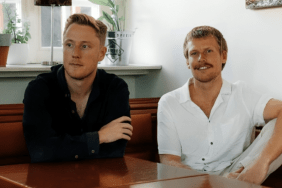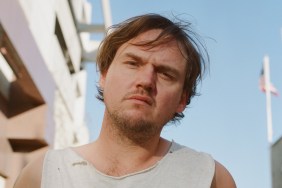There was a time – not too long ago, in a galaxy not that far away – in which Mumford & Sons were the most hated band on the planet. We’re talking Nickelback levels of vitriol. Mission: Impossible levels of diving slow motion at the radio in order to change the station whenever Little Lion Man would come on for the umpteenth time that day. Gigabyte levels of online mockery, parody, slander and abuse. When Mumford & Sons announced a break following the end of touring their second LP, 2012’s Babel, it was widely assumed that they would go gently into the good night. A mercy killing, if you will.
Cut to mid-2015, and the game changes. Mumford & Sons are back – and unlike you’ve ever seen them before. The acoustic guitar and banjo were replaced by shiny new electrics, the double bass shrunk down to regular size, the sole kick drum was filled out by an entire kit… hell, even the band’s trademark vests and slacks had been replaced by biker jackets and jeans. Who were these guys, and what had they done with Mumford & Sons? The resulting album, Wilder Mind, ended up being one of the year’s more intriguing concepts as far as pop music was concerned – a Mumford & Sons record without any of the defining traits of what made a Mumford & Sons hit. For the band, it was a shot at reinvention and – God willing – redemption.
We whisked through a rapid-fire ten-minute chat with Winston Marshall – the band’s lead guitarist and (former) banjo player – to talk about their new Wilder Mind-set and how their third album almost went synth-pop.
Watch: Mumford & Sons – The Wolf
Music Feeds: When touring ended in support of Babel, it was announced that you guys would be taking an extensive break. Some expected that you might not even get back together – and yet, writing for Wilder Mind began less than a year later. What drew you back in?
Winston Marshall: Most people don’t really get more than four weeks’ holiday a year. For us, in our mid-twenties, to say that we’d like to take time off was a bit cocky. I think what we said was taken out of context in the media – we didn’t say that this was going to be an indefinite period of time. We just needed to take a few months off from it all. We were all writing in that time off, working on stuff. It didn’t feel so drastic within the band – we were eager to get back together. We love what we do. We didn’t necessarily miss the touring, but the time off helped us enjoy being in the studio a lot more.
MF: That wasn’t a part of the band previously? Even from a production perspective, your albums don’t slouch.
WM: The first album [2009’s Sigh No More] was recorded in four weeks. The second album was recorded over the course of a year while we were touring. We’d never really spent a committed amount of time in there – this time, it came close to about two-and-a-half months recording. Before that, we were in a different studio demoing for about six months. We enjoyed the creative process a lot more -we learned to be a studio band, in a way.
Touring has always been at the centre of what we do – it’s how people came to know us originally. To move away from that and learn a bit more about writing, demoing, recording… it’s brought out a whole new side of us. After this Australian tour in November, we’re going to start demoing for the next album. We’re a lot more balanced as far as that side of things is concerned.
MF: One of the big talking points concerning Wilder Mind was the announcement that it was going to be the “no banjo” Mumford & Sons record. You’ve played banjo in the band since its inception – did that put any additional pressure on you to make sure that your guitar playing was up to scratch?
WM: Guitar is my first instrument. Banjo was something I picked up in my late teens as a bit of fun. I’ve never considered banjo as my passion – nor do I necessarily consider myself very good as a banjo player. We’ve all played different instruments as long as we’ve been playing music. Take Marcus – he’s our singer and he’s one of the guitar players, but his first instrument is drums. He’s always played drums. I’m terrible at drums, but I’d love to properly learn one day.
We’re all just keen to play other instruments – we’ve been doing that a lot on this tour. I’ve found not playing banjo to be completely liberating, to be honest – I feel a lot more free. I felt caged in when I had to play banjo every night. This is a lot more comfortable for me, really.
MF: Were there any set-in-stone rules about making Wilder Mind? Was it a matter of needing to do something different to break the mould or snap out of a spell?
WM: No, it wasn’t about rules, I don’t think. After we took our break and we reconvened, we’d all gotten excited about different instruments and were all listening to heavier music. It ended up being this sort of happy accident where we were all more interested in being a rock & roll band and making more of a rock & roll record. It wasn’t preconceived – as a matter of fact, when we were originally writing the album, a lot of the songs started in a lot more of a synthpop fashion.
The direction sort of changed and we honed it in once we started working with our producer, James [Ford]. By the end, we were asking ourselves ‘What makes this record Mumford & Sons?’ I think what we came back to was Marcus’ voice playing a huge part and the songs themselves. We pride ourselves on crafting songs – we’re not the type of band to go on a wig-out tangent. They’re short songs, to the point. We consider those things the core of our band, and that’s what we felt made this a Mumford & Sons record.
Watch: Mumford & Sons – Hopeless Wanderer
MF: Was the change in direction to do at all with feeling like the band had been painted into a corner? After all, one of the last things you guys did as a band prior to the Wilder Mind cycle was release a video for Hopeless Wanderer, which was a massive send-up of the public perception of the band.
WM: Kind of… [pauses] It’s kind of hard to know what the public perception is. When it’s your own band, it’s hard to really see that. We’re too close to it. That video is still one of my favourite things that we’ve ever done, though. We knew Jason Sudekis because we’d done Saturday Night Live when he was a cast member and he’d come to our shows whenever we were in New York. I guess we kind of wanted to do a fun video – we told the director, Sam [Jones], just to do a treatment where it kind of makes fun of us and paints us in an over-the-top way.
I guess we were a little ridiculous sometimes. [laughs] I don’t know… it wasn’t too thought-out. As far as being painted into a corner is concerned, we definitely didn’t want to be seen as a band that only did one thing. We know that this album is really different to the last one – I’m hoping the next album that we make will be even more different to this one. We’re trying to push ourselves a lot more.
MF: Your Australian tour is imminent, which will be your first proper tour in a few years. Last time you brought out some key international acts – Edward Sharpe and the Magnetic Zeros as well as Willy Mason – and this time is no exception. You’ll be joined by The Vaccines and Jake Bugg, but you’ll also be joined – quite surprisingly to some – by Future Islands. It’s a peculiar match; how did it come about?
WM: We’re massive fans. It doesn’t feel that odd to us – they were actually a massive influence on the writing of this album. Their use of synths and driving drum beats is so interesting and so unique – it made us want to make more songs that you can move to, because they’re fucking great at doing that. That Letterman performance will be remembered as one of the defining TV moments of our generation. It’s mesmerising. We saw them in Spain, and it was absolutely incredible. We’re so excited that we were able to book them for this tour. The Vaccines, too, are old friends of ours – their new album is amazing. Jake Bugg’s an incredible songwriter, too.
People definitely seem to get this idea that we’re only interested in folk music. That’s never been the case. We’re massive fans of all kinds of music – I mean, my favourite album this year, like many people, has been [Kendrick Lamar’s] To Pimp a Butterfly. I haven’t listened to a banjo in three years. Anything fresh to us is exciting.
–
The Gentlemen of the Road tour continues this week, grab all the deets below!
Watch: Mumford & Sons – Ditmas
Mumford & Sons Australian Tour
Saturday, 7th November – SOLD OUT
With special guests The Vaccines and Meg Mac
Riverstage, Brisbane
Tickets: Secret Sounds
Thursday, 12th November – SOLD OUT
With special guests Future Islands and The Vaccines
Sidney Myer Music Bowl, Melbourne
Tickets: Secret Sounds
Gentlemen Of The Road Festival
Mumford & Sons
Jake Bugg
Future Islands
The Vaccines
The Jungle Giants
Meg Mac
Art of Sleeping
Saturday, 14th November – SELLING FAST
The Domain, Sydney
Tickets: Secret Sounds












